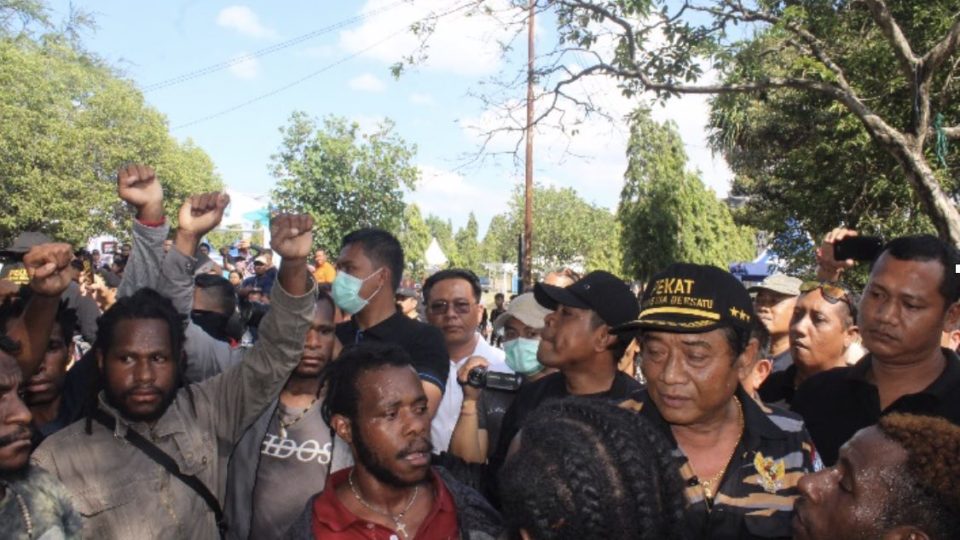On Saturday, dozens of activists from the Papuan Student Alliance (AMP) who were holding a rally to commemorate the 21st anniversary of the Biak massacre in Denpasar clashed with local organizations and pecalang (traditional Balinese security forces) during their demonstration, with some of them physically assaulted.
In a statement detailing the chronology of Saturday’s events received by Coconuts Bali, AMP said local organizations and several people claiming to be pecalang blocked their way just as they were about to start their rally.
“They insisted that we are not allowed to go on with our rally … There was a clash between demonstrators and members of local organizations, during which some of us were hit, kicked and pulled,” AMP said, adding that their posters and banners were also ruined in the process.
Throughout all this, AMP added that the police just stood by and watched.
Around 40 people took part in Saturday’s rally, which was organized to commemorate the 21st anniversary of Biak massacre, one of several long-standing human rights abuses in Papua that remains unresolved to this day.
Commemorating biak massacre and building solidarity
On July 6, 1998, demonstrators who took part in a peaceful rally where the West Papuan Morning Star Flag was raised several days prior were attacked by Indonesian security forces. AMP claimed the massacre not only killed eight people and injured several others, but also led to three people going missing and the arbitrary detainment of dozens others. In addition, around 150 were tortured, while 32 people died mysterious deaths.
“This is why, on July 6, 2019, all of us from AMP Bali called for a complete investigation on human rights abusers in Biak massacre, as well as all other human rights violations in Papua,” AMP said in the statement.
Abet Gobai, secretary general of AMP’s Bali chapter, told Coconuts Bali, that this is the fifth time the group experienced repression during their rallies. On April 15, Abet said police arrested a number of AMP members during a protest in Denpasar.
“We are witnessing bigger repression, discrimination and silencing in our democratic spaces. The police fail to create a conducive environment when securing mass rallies, [instead] letting go of their responsibility by allowing clashes between local organizations, traditional police and protesters,” Abet said.
Abet also said that other chapters of AMP in the country have experienced similar repression.
Last December, police detained AMP demonstrators in the East Java capital of Surabaya, who took part in a rally commemorating the 57th anniversary of Papua declaring itself an independent nation. More recently, police reportedly dispersed peaceful rallies organized by AMP in Ambon on July 6 and another one in Surabaya on July 1.
As reported by Radar Bali, Nyoman Gatra from the Denpasar Police said that the demonstrators in Bali has violated the law on freedom of speech.
“It’s because they called for anti-unity during their speech … but due to cooperation between the Indonesian military, police and the local community, they dispersed from the rally. They are students, it’s better for them to use their time to study,” Gatra said.
However, Abet said that AMP’s public rallies have been focused on building solidarity on issues faced by native Papuans, including during their rally on Saturday.
In a 2018 report, Amnesty International accused Indonesian security forces of having committed nearly 100 extrajudicial killings in Papua and West Papua since 2010, with little to no accountability. The gov’t has continued to use anti-separatist arguments to validate the use of excessive force in Papua, though the international rights group said most of the recorded extrajudicial killings did not take place in a political environment.
Papua was a colony of the Dutch until the early 1960s, when it declared itself an independent nation in 1961. Neighboring Indonesia took control of the region by force in 1963 and officially annexed it with a UN-backed referendum in 1969 that was widely seen as a sham.




